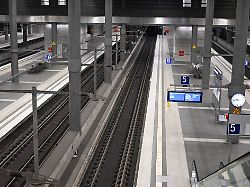Multi-day strike starting Wednesday
Bahn fails with interim injunction against GDL strike
January 8, 2024, 8:47 p.m
Listen to article
This audio version was artificially generated. More info | Send feedback
With an interim injunction, the railway wants to prevent the train drivers’ strike lasting several days. But the Frankfurt Labor Court rejected the urgent application. The GDL union wins in the first instance and is allowed to strike. But the group still has a chance.
According to the Frankfurt Labor Court, the German Locomotive Drivers’ Union (GDL) is allowed to strike on rail transport in Germany from Wednesday. The court has rejected an interim injunction from Deutsche Bahn in the first instance, as it announced in the evening. “The GDL is not obviously incapable of collective bargaining,” said the presiding judge as justification. Deutsche Bahn AG doubts this, but has concluded numerous contracts with GDL in the past.
The federally owned company initially failed in its attempt to legally stop the industrial action as part of the collective bargaining dispute with the union. The railway immediately appealed. The state labor court will now decide in the second instance on Tuesday. A date had not yet been set in the evening. This option is also open to the railway company Transdev, which had previously also failed in parallel proceedings before the labor court.
If the railway fails before the Hessian State Labor Court, passengers will again have to prepare for far-reaching restrictions on Deutsche Bahn’s passenger transport between Wednesday and Friday. The GDL strike is scheduled to last nationwide from Wednesday morning at 2 a.m. to Friday evening at 6 p.m. Not only Deutsche Bahn would be affected, but also its competitor Transdev, among others. As with previous industrial disputes, the effects are likely to be felt in the hours before and after.
GDL declares negotiations have failed
Subject to the LAG’s decision, it is the third and longest industrial dispute to date in the ongoing collective bargaining dispute. Since the beginning of November, the GDL has been arguing with the railways and other companies for more money. The crux of the matter, however, is the union’s demand for a reduction in working hours for shift workers from 38 to 35 hours per week with full wage compensation. The GDL has already declared the negotiations with the railways to have failed.
There have been warning strikes lasting a maximum of 24 hours twice so far. In December, union members approved indefinite strikes in a strike vote with a majority of 97 percent. Since then, longer industrial disputes have been possible. GDL boss Claus Weselsky described the almost three-day strike as proportionate.
In the negotiations in court, the GDL plan played a role in lending out its own members as train drivers to railway companies via the “Fair Train” cooperative. From the perspective of the railway companies, the union also acts as an employer and should therefore no longer be allowed to conclude collective agreements. The GDL, on the other hand, sees a clear organizational separation between the union and the cooperative. In addition, no train driver is yet working for Fair Train and the cooperative is not yet active in business. There is another lawsuit brought by the DB against the GDL on this issue.
Train cannot guarantee a ride
Deutsche Bahn assumes that the train drivers’ strike will affect millions of passengers this week. As with the previous labor disputes in the current collective bargaining round, it wants to offer an emergency timetable with severely limited services. “For these journeys, the DB uses longer trains with more seats in order to be able to bring as many people as possible to their destination. However, a ride cannot be guaranteed,” the company announced on Sunday evening.
During the GDL warning strikes last year, the railway had to cancel around 80 percent of its long-distance transport services. The effects on regional transport varied greatly depending on the region. In some federal states there were almost no trains running anymore. Unless strike participation differs fundamentally, similar effects can now be expected.
“This strike is not only absolutely unnecessary, but we also believe it is not legally permissible,” said Deutsche Bahn’s human resources director Martin Seiler. However, the labor court in Frankfurt did not share this opinion.
